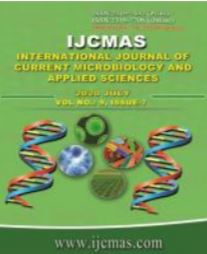


 National Academy of Agricultural Sciences (NAAS)
National Academy of Agricultural Sciences (NAAS)

|
PRINT ISSN : 2319-7692
Online ISSN : 2319-7706 Issues : 12 per year Publisher : Excellent Publishers Email : editorijcmas@gmail.com / submit@ijcmas.com Editor-in-chief: Dr.M.Prakash Index Copernicus ICV 2018: 95.39 NAAS RATING 2020: 5.38 |
Pomegranate (Punica granatum L.) is one of the important fruit crops belongs to the family Lythraceae. Nowadays most of the fields were infested by root knot nematode caused by Meloidogyne incognita which results in yellowing and stunting of plant further it affects the total yield of the crop. Four nematicides and five oil cakes were evaluated against number of juveniles emerged from egg mass at 24, 48 and72 hours interval against M. incognita in laboratory condition for their efficacy against the pathogen. Further evaluated before and after inoculation of pathogen in potsto check the effect onplant growth parameters like fresh shoot weight, dry shoot weight, fresh root weight, dry root weight, shoot length, root length and disease parameters like yellowing of leaves and number of galls (grade) in all the treatments in comparison to uninoculated control. Among the nematicides phorate (0.01 g/ml) was found effective as it recorded significantly least numbers over all other nematicides with respect to number of juveniles emerged (1.56) followed by carbosulfan (11.22). Among the oil cakes neem cake was found significantly superior over all other nematicides as it recorded least number of juveniles emerged (2.45) followed by pongamia cake (7.33). The number of juveniles emerged increased steadily as number of hours increased. Among the treatments, neem cake and phorate applied plants prior and after inoculation of M. incognita showed higher fresh shoot weight, dry shoot weight, fresh root weight, dry root weight, shoot length, root length and less number of galls.
 |
 |
 |
 |
 |